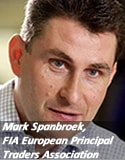Liquidity in derivatives instruments on Deutsche Börse's Eurex platform could shift to competitors NYSE Liffe and Nasdaq's new NLX venue as a new German law requires high-frequency trading (HFT) firms to register with national regulator BaFin.
Currently, 'passport' rules under MiFID allows firms supervised by domestic regulators to operate in other European markets - for instance a UK-based firm trading in Germany – although this may be limited by differences in domestic supervision categories. Many high-frequency trading (HFT) firms are regulated only as 'local entities' and may not be eligible for the passport option.
But the new law requires non-European firms currently trading on Eurex to register with BaFin – a prohibitive process due to the need to operate locally – or to set up a subsidiary in another European country and attempt to 'passport' into German markets.
Mark Spanbroek, vice chairman of the Futures and Industry Association's European Principal Traders Association, a HFT lobby group, believes German regulators must move to give participants more clarity well in advance of the new rules, which he says will hit derivatives much harder than cash equities.
Spanbroek said the UK would be an attractive option for a company looking to set up a European base and that local regulator the Financial Conduct Authority (recently the Financial Services Authority) had been involved in ironing out details of which firms would be granted the MiFID passport option.
"If these issues are not sorted out over the next few months there will potentially be a shift in liquidity from Eurex to NYSE Liffe and Nasdaq's NLX platform, and a return to [the] regulatory arbitrage in Europe MiFID aimed to eradicate," he said. He added that domestic regulators had been forced to work with German authorities and trade groups to decide which cross-border licensing options would be permitted.
"The FCA needs to look at this issue closely because there could be sponsored-access issues for firms looking to use the UK as a European base. We are working with both BaFin and other national regulators in Europe to find a solution to these issues," he said.
The new law, first mooted last July, changes Germany's Securities Trading Act, the German Banking Act and Exchange Act to include provisions for HFT trading across all financial instruments. It also increases BaFIN's powers to supervise electronic trading.
Exemption clarity
Randolf Roth, head of market structure for Eurex, believes both EU and non-EU firms will be able to seek exemptions if they are appropriately regulated in their home countries, but agreed greater regulatory clarity was needed about the law's impact on market participants.
"Until further details are established by BaFin it remains to be seen how many firms will be affected. Traditional market participants such as asset managers will not be directly affected by the banking act licence requirement," he said. As the dominant listed derivatives exchange in Germany, Eurex could see a large amount of HFT flow disperse to other venues, which may entice non-HFT firms chasing more liquidity to other venues.
"With regard to HFT-firms being required to take regulatory actions under the bill's banking act licence requirement, it is at this time difficult to predict how many of those will accept the additional regulation or simply stop trading as the bills implication maybe to burdensome to those foreign firms," Roth said.
 Andreas Wieland, counsel at law firm Shearman and Sterling, who has monitored developments, doubted whether BaFin would be generous in granting exemptions.
Andreas Wieland, counsel at law firm Shearman and Sterling, who has monitored developments, doubted whether BaFin would be generous in granting exemptions.
"I don't think institutions should be too optimistic about the merits of applying to BaFin for an exemption from the license requirement," said Wieland. "BaFin typically handles the granting of exemptions in a very restrictive manner and I don't see on which basis one should hope that this will be different with respect to high frequency firms."
Wieland said US- and Asia-based firms could use the Germany HFT law to establish a European base ahead of rules expected in MiFID II that will make them subject to EU-wide licensing arrangements.
MiFID II is expected to come into force sometime in 2015 and the European Parliament's draft text, finalised last year, includes a slew of provisions aimed at curbing the proliferation of predatory HFT strategies. They include a minimum resting time, venue-established order-to-trade ratios, and a ban on maker-taker pricing models.
